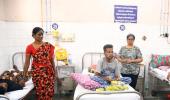The Bombay high court on Wednesday took suo motu cognizance of the deaths at two state-run hospitals in Nanded and Chhatrapati Sambhajinagar cities and noted that the reasons given by doctors citing the shortage of beds, staff, and essential medicines cannot be accepted.

The HC also sought details from the Maharashtra government.
A division bench of Chief Justice D K Upadhyaya and Justice Arif Doctor asked Advocate General Birendra Saraf, appearing for the state government, to submit to the bench the details about the state's budgetary allocation for health on Friday.
Earlier in the day, an advocate, Mohit Khanna, had submitted a letter to the bench requesting it to take suo motu cognizance of the deaths.
The bench initially directed Khanna to file a petition and said it wanted to issue effective orders. It also asked the advocate to gather data regarding vacancies in the hospitals, availability of medicine, the percentage (of funds) the government is spending and so on.
However, in the afternoon session, the bench said it was taking suo motu cognizance of the issue noting that reasons given by the doctors at the hospitals citing shortage of beds, staff, and essential medicines cannot be accepted.
"Shortage of staff, essential medicines and beds...if deaths are happening due to these reasons, then it cannot be accepted," CJ Upadhyaya said.
Saraf told the bench that he would submit all details on the issue.
The HC said it would hear the matter on Friday.
Khanna in his letter stated 31 deaths, including those of infants, were recorded at the Dr Shankarrao Chavan Government Medical College and Hospital in Nanded in 48 hours since September 30.
The letter also mentioned that the deaths of 18 patients, including infants, were recorded between October 2 and 3 at the Government Medical College and Hospital at Chhatrapati Sambhajinagar.
Maharashtra Chief Minister Eknath Shinde on Tuesday said his government had taken the deaths at the Nanded hospital very seriously, and appropriate action would be taken after a detailed inquiry. He denied that there were shortages of medicines and staff.










